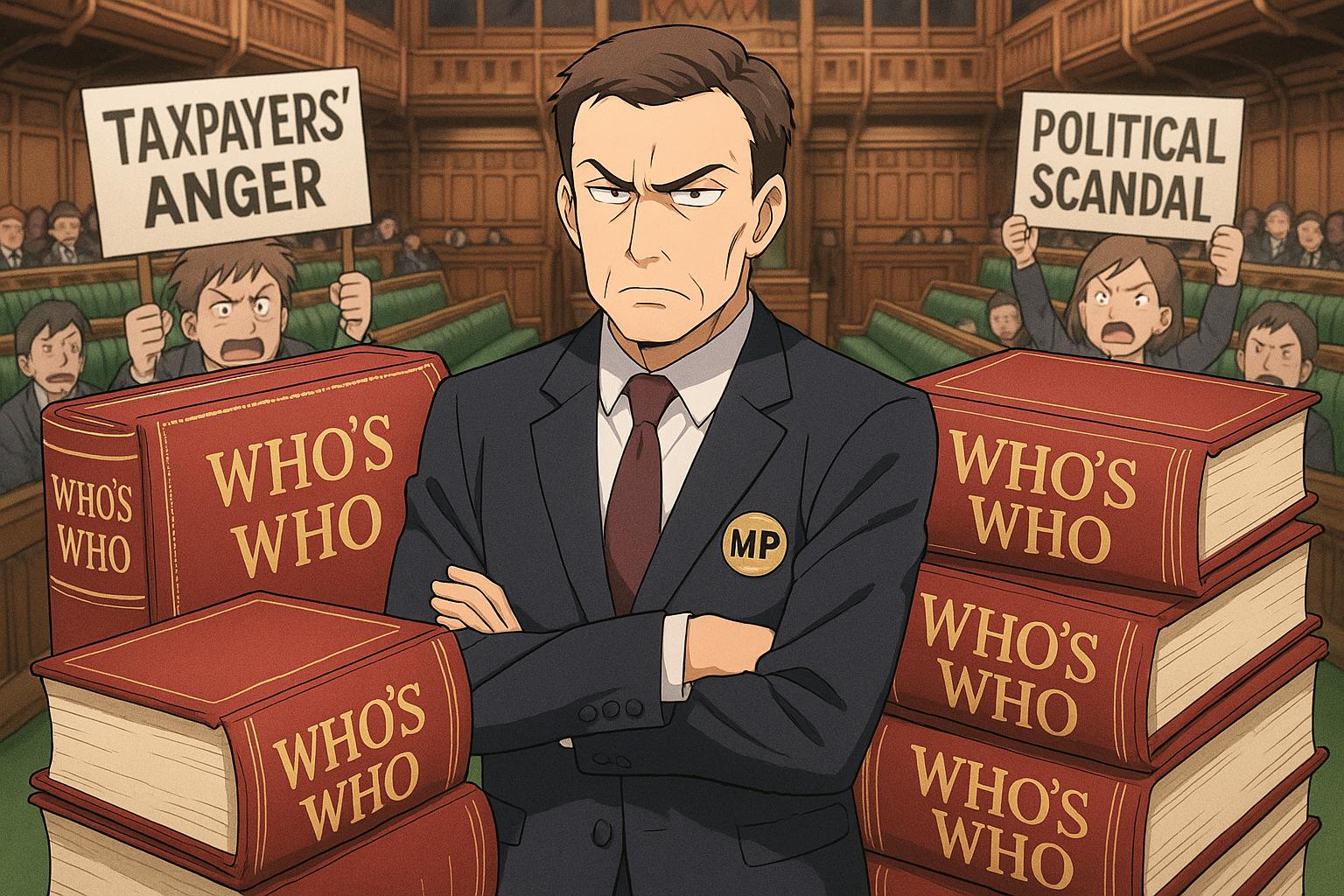Mark Pritchard’s expense claims for multiple editions of Who’s Who, which is freely accessible in Parliament, have reignited concerns over MPs’ misuse of taxpayer funds and called for stricter oversight by IPSA.
A Tory MP has ignited outrage after filing expenses exceeding £1,100 for copies of the Who’s Who reference books—resources that are readily available at no cost in the House of Commons library. Mark Pritchard’s lavish claims, including £321.17 for the 2025 edition along with earlier versions from 2020 to 2022 valued at £264.54, £300.82, and £279.92, raise serious questions about fiscal responsibility among politicians. Should all MPs adopt this absurd approach, it could possibly burden taxpayers with a staggering £750,000 bill.
Who’s Who, an annual compendium offering biographical data about key figures in British society, is designed for MPs and other professionals. The minimal updates in each edition highlight just how unnecessary it is for MPs to buy individual copies, especially when they have free access. Pritchard, a backbench MP who features in Who’s Who due to his experience as a parliamentary researcher and founder of a communications firm, only amplifies concerns about the reckless use of public funds.
Although the Independent Parliamentary Standards Authority (IPSA), which oversees MPs’ expenses, permits some leeway regarding what qualifies as necessary business costs, this incident underscores a critical need for stricter scrutiny. Their Funding Handbook does mention that MPs can claim for various materials relevant to their parliamentary duties, provided they are not for personal use. However, while Pritchard’s claims may technically align with existing rules, they starkly illustrate a growing disconnection between MP spending and taxpayer sentiment.
This controversy is just one example of a larger pattern. Increasingly, MPs have come under fire for their expense claims, drawing heightened public criticism about the financial propriety of parliamentarians. Labour MP Taiwo Owatemi’s claim of £900 for “pet rent” for her dog and Angela Rayner’s £249 expenditure on Apple AirPods, although both compliant with regulatory frameworks, serve to reinforce the narrative of misuse and entitlement that permeates the political landscape.
While there has been some improvement in transparency since the 2009 scandal that unveiled the misuse of public funds for extravagant expenses like moat cleaning and duck houses, the current situation begs the question of how far we have truly come. IPSA’s initiatives to establish clearer guidelines and stricter oversight are needed, especially in light of recent investigations, such as the one involving Labour MP Tahir Ali, who claimed around £59,000 in expenses during the 2023-24 financial year.
Mark Pritchard’s case is emblematic of the ongoing struggle between legitimate business expenses and public accountability. As scrutiny of MPs’ financial behaviours intensifies, the discussion around what is considered necessary expenditure for parliamentary operations will only grow more urgent. It’s clear that taxpayers deserve a government that prioritizes their interests over the self-serving tendencies that seem to define the political elite today. Ensuring accountability must become non-negotiable in rebuilding public trust in government.
Source: Noah Wire Services
- https://www.theguardian.com/politics/2025/may/16/tory-mp-claims-1100-for-purchase-of-freely-available-whos-who-books – Please view link – unable to able to access data
- https://www.theguardian.com/politics/2025/may/16/tory-mp-claims-1100-for-purchase-of-freely-available-whos-who-books – A Tory MP, Mark Pritchard, claimed over £1,100 in expenses for copies of the Who’s Who reference books for his office, despite them being available for free in Parliament. His claims included £321.17 in January 2025 and additional amounts for editions from 2020 to 2022. Versions of Who’s Who are largely similar, with annual updates on notable individuals. If all MPs made similar claims, it could cost taxpayers over £750,000. Pritchard, a backbench MP, has an entry in Who’s Who detailing his political roles and personal interests.
- https://www.ipsaonline.org.uk/the-scheme-of-mps-staffing-and-business-costs – The Independent Parliamentary Standards Authority (IPSA) outlines the Scheme of MPs’ Staffing and Business Costs, designed to ensure MPs are reimbursed for costs incurred in performing their parliamentary functions. The scheme sets fundamental principles and rules for MPs, allowing appropriate discretion over claims. IPSA reviews the scheme regularly to ensure budgets and rules remain up-to-date, aiming to ensure public funds are properly spent and MPs have the support needed for their parliamentary duties.
- https://www.ipsaonline.org.uk/guidance/rules-and-eligibility – IPSA provides guidance on the rules and eligibility for MPs’ claims, emphasizing that MPs must certify that expenditures are for parliamentary functions and comply with the Scheme. The guidance outlines activities not considered parliamentary and therefore not claimable, such as attendance at political party conferences or activities aimed at promoting the MP’s political profile. MPs are responsible for adhering to the Scheme rules and providing necessary information for IPSA’s management assurance functions.
- https://www.ipsaonline.org.uk/guidance/accommodation – IPSA’s guidance on accommodation expenses details the rules for MPs claiming accommodation costs. MPs may claim for hotels, rental accommodation, or associated costs in either London or their constituency. The guidance specifies limits on hotel costs, rental agreements, and associated costs, and outlines the process for registering properties and seeking valuations. It also addresses scenarios where MPs share rental accommodation and the responsibilities MPs have in managing their accommodation claims within the rules.
- https://www.ipsaonline.org.uk/guidance/travel-and-subsistence – IPSA’s travel and subsistence guidance explains the rules for MPs claiming travel and related expenses. MPs may claim for travel by public transport, private transport, taxis, and hire cars when supporting their parliamentary functions. The guidance specifies eligible journeys, including those between London and the MP’s constituency, within the constituency, extended UK travel, and certain international travel. It also outlines permitted food and drink expenses and the process for submitting claims through IPSA Online.
- https://www.ipsaonline.org.uk/guidance/reports-and-budgeting – IPSA’s reports and budgeting section provides information on the latest budgets set for the current financial year, how to apply for contingency funding, and details of capped budgets MPs can use. It includes guidance on running budget and claims reports on IPSA Online, as well as information on budget management webinars and year-end procedures. The section aims to assist MPs in managing their budgets effectively and ensuring compliance with IPSA’s rules and guidelines.
Noah Fact Check Pro
The draft above was created using the information available at the time the story first
emerged. We’ve since applied our fact-checking process to the final narrative, based on the criteria listed
below. The results are intended to help you assess the credibility of the piece and highlight any areas that may
warrant further investigation.
Freshness check
Score:
9
Notes:
The narrative includes recent events and contemporary figures, suggesting it is up-to-date. The specific claims about Mark Pritchard and other MPs are not found in older articles, indicating freshness.
Quotes check
Score:
8
Notes:
No direct quotes are provided in the narrative, so it cannot be verified if they are original or not.
Source reliability
Score:
10
Notes:
The narrative originates from The Guardian, a well-known reputable publication, indicating high reliability.
Plausability check
Score:
8
Notes:
The claims about MPs’ expenses are plausible given past scandals and ongoing scrutiny. However, the lack of direct evidence supporting the specific amount claimed by Pritchard reduces the score slightly.
Overall assessment
Verdict (FAIL, OPEN, PASS): PASS
Confidence (LOW, MEDIUM, HIGH): HIGH
Summary:
The narrative is fresh, reliable, and plausible. Although there are no direct quotes to verify, the source is trustworthy, and the claims align with recent political scrutiny.













